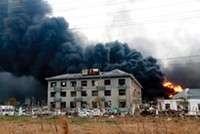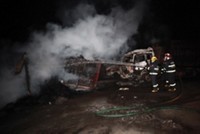Advertisement
Grab your lab coat. Let's get started
Welcome!
Welcome!
Create an account below to get 6 C&EN articles per month, receive newsletters and more - all free.
It seems this is your first time logging in online. Please enter the following information to continue.
As an ACS member you automatically get access to this site. All we need is few more details to create your reading experience.
Not you? Sign in with a different account.
Not you? Sign in with a different account.
ERROR 1
ERROR 1
ERROR 2
ERROR 2
ERROR 2
ERROR 2
ERROR 2
Password and Confirm password must match.
If you have an ACS member number, please enter it here so we can link this account to your membership. (optional)
ERROR 2
ACS values your privacy. By submitting your information, you are gaining access to C&EN and subscribing to our weekly newsletter. We use the information you provide to make your reading experience better, and we will never sell your data to third party members.
Environment
Blast At Chinese Plant Kills Four
Coal Chemicals: Facility made polyvinyl chloride via the acetylene process
by Jean-François Tremblay
November 29, 2010
| A version of this story appeared in
Volume 88, Issue 48

A Nov. 20 explosion at a polyvinyl chloride plant in northern China killed four people and injured dozens of others, according to government reports. The Yushe Chemical Industry complex where the accident took place uses acetylene as a feedstock to produce the polymer.
Owned by the local government of Yushe, a county in coal-rich Shanxi province, Yushe Chemical employs 2,700 people. The firm has been in operation since the 1970s and, according to its website, can make 400,000 metric tons of PVC per year from coal-derived acetylene. The acetylene is generated by hydrolysis of calcium carbide, which is in turn produced from lime and coal-derived coke.
After the explosion, firefighters spent more than 14 hours extinguishing a blaze that raged at the plant site. The government of Yushe later said its initial priority was to take care of the seriously injured. An investigation into the cause of the accident is under way. No hazardous substances were released into the environment, the Chinese government reported.
China produces most of its PVC via the acetylene process because coal is abundant in the country, whereas the oil and gas used in the more common ethylene-based PVC route are not. The acetylene process is controversial: It produces large amounts of waste and requires a mercury-containing catalyst (C&EN, Jan. 18, page 18).
Producing PVC from acetylene is not inherently more hazardous than making it from ethylene, says Eddie Kok, director of Asian chlor-alkali and vinyls studies at the market research firm Chemical Market Associates, in Singapore. And the safety record of the acetylene route in China is historically no worse than that of the ethylene process, he notes.
A number of Western companies are pursuing production of coal-based chemicals in China, although typically they are exploring coal-to-methanol technology. Dow Chemical and the Chinese coal producer Shenhua are planning a large complex in coal-laden Shaanxi province, and France’s Total recently announced a coal chemicals complex in Inner Mongolia.




Join the conversation
Contact the reporter
Submit a Letter to the Editor for publication
Engage with us on Twitter